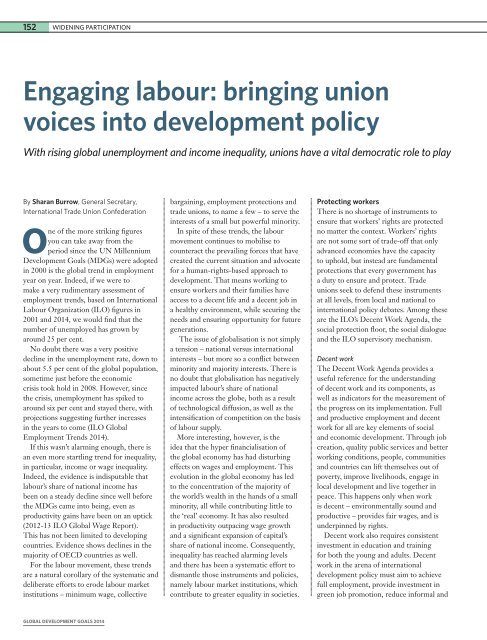FAMBB
FAMBB
FAMBB
You also want an ePaper? Increase the reach of your titles
YUMPU automatically turns print PDFs into web optimized ePapers that Google loves.
152 WIDENING PARTICIPATIONEngaging labour: bringing unionvoices into development policyWith rising global unemployment and income inequality, unions have a vital democratic role to playBy Sharan Burrow, General Secretary,International Trade Union ConfederationOne of the more striking figuresyou can take away from theperiod since the UN MillenniumDevelopment Goals (MDGs) were adoptedin 2000 is the global trend in employmentyear on year. Indeed, if we were tomake a very rudimentary assessment ofemployment trends, based on InternationalLabour Organization (ILO) figures in2001 and 2014, we would find that thenumber of unemployed has grown byaround 25 per cent.No doubt there was a very positivedecline in the unemployment rate, down toabout 5.5 per cent of the global population,sometime just before the economiccrisis took hold in 2008. However, sincethe crisis, unemployment has spiked toaround six per cent and stayed there, withprojections suggesting further increasesin the years to come (ILO GlobalEmployment Trends 2014).If this wasn’t alarming enough, there isan even more startling trend for inequality,in particular, income or wage inequality.Indeed, the evidence is indisputable thatlabour’s share of national income hasbeen on a steady decline since well beforethe MDGs came into being, even asproductivity gains have been on an uptick(2012-13 ILO Global Wage Report).This has not been limited to developingcountries. Evidence shows declines in themajority of OECD countries as well.For the labour movement, these trendsare a natural corollary of the systematic anddeliberate efforts to erode labour marketinstitutions – minimum wage, collectivebargaining, employment protections andtrade unions, to name a few – to serve theinterests of a small but powerful minority.In spite of these trends, the labourmovement continues to mobilise tocounteract the prevailing forces that havecreated the current situation and advocatefor a human-rights-based approach todevelopment. That means working toensure workers and their families haveaccess to a decent life and a decent job ina healthy environment, while securing theneeds and ensuring opportunity for futuregenerations.The issue of globalisation is not simplya tension – national versus internationalinterests – but more so a conflict betweenminority and majority interests. There isno doubt that globalisation has negativelyimpacted labour’s share of nationalincome across the globe, both as a resultof technological diffusion, as well as theintensification of competition on the basisof labour supply.More interesting, however, is theidea that the hyper financialisation ofthe global economy has had disturbingeffects on wages and employment. Thisevolution in the global economy has ledto the concentration of the majority ofthe world’s wealth in the hands of a smallminority, all while contributing little tothe ‘real’ economy. It has also resultedin productivity outpacing wage growthand a significant expansion of capital’sshare of national income. Consequently,inequality has reached alarming levelsand there has been a systematic effort todismantle those instruments and policies,namely labour market institutions, whichcontribute to greater equality in societies.Protecting workersThere is no shortage of instruments toensure that workers’ rights are protectedno matter the context. Workers’ rightsare not some sort of trade-off that onlyadvanced economies have the capacityto uphold, but instead are fundamentalprotections that every government hasa duty to ensure and protect. Tradeunions seek to defend these instrumentsat all levels, from local and national tointernational policy debates. Among theseare the ILO’s Decent Work Agenda, thesocial protection floor, the social dialogueand the ILO supervisory mechanism.Decent workThe Decent Work Agenda provides auseful reference for the understandingof decent work and its components, aswell as indicators for the measurement ofthe progress on its implementation. Fulland productive employment and decentwork for all are key elements of socialand economic development. Through jobcreation, quality public services and betterworking conditions, people, communitiesand countries can lift themselves out ofpoverty, improve livelihoods, engage inlocal development and live together inpeace. This happens only when workis decent – environmentally sound andproductive – provides fair wages, and isunderpinned by rights.Decent work also requires consistentinvestment in education and trainingfor both the young and adults. Decentwork in the arena of internationaldevelopment policy must aim to achievefull employment, provide investment ingreen job promotion, reduce informal andGLOBAL DEVELOPMENT GOALS 2014


